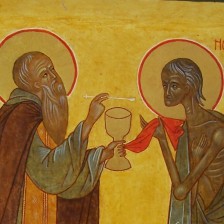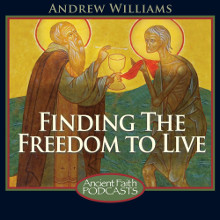 What does participation in the Holy Mysteries of the Church offer us who are enslaved by our addiction?
What does participation in the Holy Mysteries of the Church offer us who are enslaved by our addiction?
Today I’m concluding the short series on finding a path out of addiction, and today we’re looking at the most powerful spiritual weapon of all: participation in Christ through the holy mystery of communion.
St Theophan tells us that “the four weapons of which we have spoken receive their power from the forces and gifts of grace, obtained for us by the blood of Christ.” And the mystery of holy communion “is Christ’s blood itself, and His flesh itself, in which Christ is Himself present as God.”
As I’ve emphasized, our central aim as strugglers must be to find union and communion with Christ, and our two key principles follow from this: that we bear always in ourselves a wholehearted love for Christ and desire for union with Him, and that we open ourselves to accept humiliation from the world — which is to be united to Christ in his voluntary ascending of the cross.
We cannot reverse the crucifixion, or escape it. Our place is to stand at the Cross. Share on X
As strugglers we know that we cannot reverse the crucifixion, or escape it. Our place is to stand at the Cross. To be with Christ in his suffering as he is with us in ours. Our place is to carry our own cross, and venerate it.
As St Paul says, we were baptized into Christ’s death, buried with him in baptism, so that we can also find new life united with Him in the resurrection. This way we die to sin and live for God in Christ Jesus (Rom. 6:3-11).
And having been baptized, having renounced the devil and spat upon him, having been united to Christ, this new life is manifest immediately by participating in the joyful mysteries of Christ’s body and blood in the Divine Liturgy for the first time.
In ourselves we always fall, and our only recourse is to God’s mercy and infinite love. Share on XEvery time we have the opportunity to participate, anticipating the joy of participation in the holy mysteries, our soul is excited to prepare itself. Part of this preparation comes in confessing our sins and struggles. We do this not in a spirit of toxic shame, as if I thought of myself as a perfected saint who could not fall, as if I thought that, despite my imperfect trust in God, I should have succeeded in living a perfect life… No, we confess in a spirit of contrition, but knowing ourselves to be chief among sinners, we know that in ourselves we always fall, and our only recourse is to God’s mercy and infinite love. So we confess and receive forgiveness, so that we can go out again renewed and prepared to present ourselves before the holy gifts and offer ourselves to God as he offers Himself to us.
Sorrow for our sins is a part of the joy of our self-offering and our receiving of Christ’s self-offering for us. We empty ourselves in confession in order to be filled with Christ anew. All of our steps, all of our struggles, are orientated to this moment. We empty ourselves of our sins in order to be filled with the Holy Spirit, not wishing to be like the home of the unclean spirit that Christ tells us of:
“After an unclean spirit has gone out of a man, he wanders through dry places seeking rest and does not find it. He then says, ‘I will return into my house from which I came out,’ and when he has come back, he finds it empty, swept, and put in order! Then, he goes and brings with himself seven other spirits more evil than he, and they enter in and dwell there. And so, the last state of that person becomes worse than the first” (Mt. 12:43-45).
No, we seek to be filled directly with the Holy Spirit. To fill the emptiness inside with Christ. In the Divine Liturgy we offer ourselves to Christ as he offers Himself to us.
In our addiction, we are trying to receive from others without offering ourselves. We are looking to have our emptiness filled. We are looking to have our inadequacies hidden. We are looking to cover our anxiety. We are looking for pleasure to help us feel good in ourselves. We are looking for comfort.
None of these are bad desires at root, but in our addiction we are looking for the shortcut… we are looking to overcome crucifixion by escaping, avoiding, or reversing it. This is not possible, and so the fulfillment the addiction promises us it cannot truly deliver.
Our desires are there to be fulfilled, but they cannot be fulfilled by our addiction. Share on X
These desires are there to be fulfilled, but they cannot be fulfilled by the addiction or the sin. C S Lewis found a way to deal with those desires. As he wrote to a friend,
“Lying on that study sofa…I had sensations which you can imagine. And at once I knew that the Enemy would take advantage of the vague longings and tendernesses to try and make me believe later on that he had the fulfillment that I really wanted. So I balked him by letting the longings go even deeper and turning my mind to the One, the real object of all desire, which… is what we are really wanting in all wants.”
The longing is an image, and we have to know of what it is really an image. The longing itself, the desire, is an icon — an earthly veil which invites us into a deeper, Heavenly Reality. But the enemy wants us to see the mask and to be distracted and confused by it. The temptation is to see the mask and imagine that these longings can be met by the shortcut to fulfillment. But we know that we need to look behind the temptation for the hand of God.
With every temptation, God will also create a way to escape – St Paul Share on XSt Paul tells us, “No temptation has come to you that is not common to everyone. God is faithful: he will not allow you to be tempted beyond what you are able to resist, but with the temptation he will also create a way to escape, so that you may be able to endure it” (1 Cor. 10:13). God’s presence is where those longings are really directed, and if we can see behind the mask, we can turn the mask into a veil — an icon that manifests our real longing for union with God in Christ. But if we are distracted by the mask, the mask hardens, and becomes a cover over the Reality of our desires, misdirecting us to the world, the flesh and the devil.
St Paul goes on, “You cannot partake of the table of the Lord and the table of demons as well” (1 Cor. 10:21). So do we fail to see beyond the mask — do we believe the demons and imagine we can fulfil our desires in eating, drinking, and physical union in sex, or do we look beyond the mask, and see that these things are actually all physical icons of true communion, which is begun through eating and drinking at the Eucharistic feast?
In participating in the mystery of Christ’s body and blood, in uniting ourselves with Him physically in communion, we are experiencing a taste of the ultimate union and fulfillment. I’ve said before that in the icon, the veil between this world and the fuller, deeper spiritual reality is very thin. Here in the Divine Liturgy it is at its thinnest. As we gather together in church with the saints and the cherubim and seraphim, as we lay aside our earthly cares, we offer ourselves and the whole world fully to Christ and receive his offering of himself fully to us all.
We unite ourselves to Christ, and taste that real communion — take into ourselves, into our own bodies, minds, and spirits that true communion that really can fill our emptiness, really can deal with our inadequacies — not by hiding them, but by transforming them just as the wounds on Christ’s hands and feet were transformed in the resurrection. Here our anxiety is transformed by the peace that is given to us. Here we find not just momentary pleasure, but true, transcendent joy, and here we find ultimate comfort in receiving the Holy Spirit, the Comforter.
You are of value not for what you have but for what you are – Archimandrite Vasileios Share on X
In his book, Hymn of Entry, Archimandrite Vasileios writes, “In the Divine Liturgy… you are not isolated and separated from other people and things. You are not enclosed in the prison of space. You are not stifled by the condemnation of living in time. Your life is not a glass of water which does not quench your thirst if you drink it, and goes bad before your eyes if you do not…. The mystery of life is summed up and worked out in your being, in your character. You are an image of God. You are of value not for what you have but for what you are; and you are a brother of the Son… God, who is above all, may be recognized in the very texture of your person… You see him dwelling within you. And you discern traces of Him in your insatiable thirst for life and in your love. The struggle to reach Him is the very vision of His face. It is the fundamental principle of your being.”
This is our experience in the Divine Liturgy. And then, after singing in joy that we have found the true light and received the Heavenly Spirit; that we have found the true faith, worshipping the undivided Trinity who has saved us; after that we go out again into the world renewed, with a grateful heart, and we carry this communion with us in our bodies, minds, and spirits as we go about our daily lives… keeping the vision of Christ before our eyes, fighting the spiritual battles when they arise using our spiritual weapons, and doing all in the context of continuing our communion with Christ spiritually as we continue to bear in ourselves that wholehearted love for Him and desire for His presence with us always, a presence which he has promised always to offer: “‘Behold, I am with you always, even to the end of the age.’ Amen” (Mt. 28:20).


You must be logged in to post a comment.